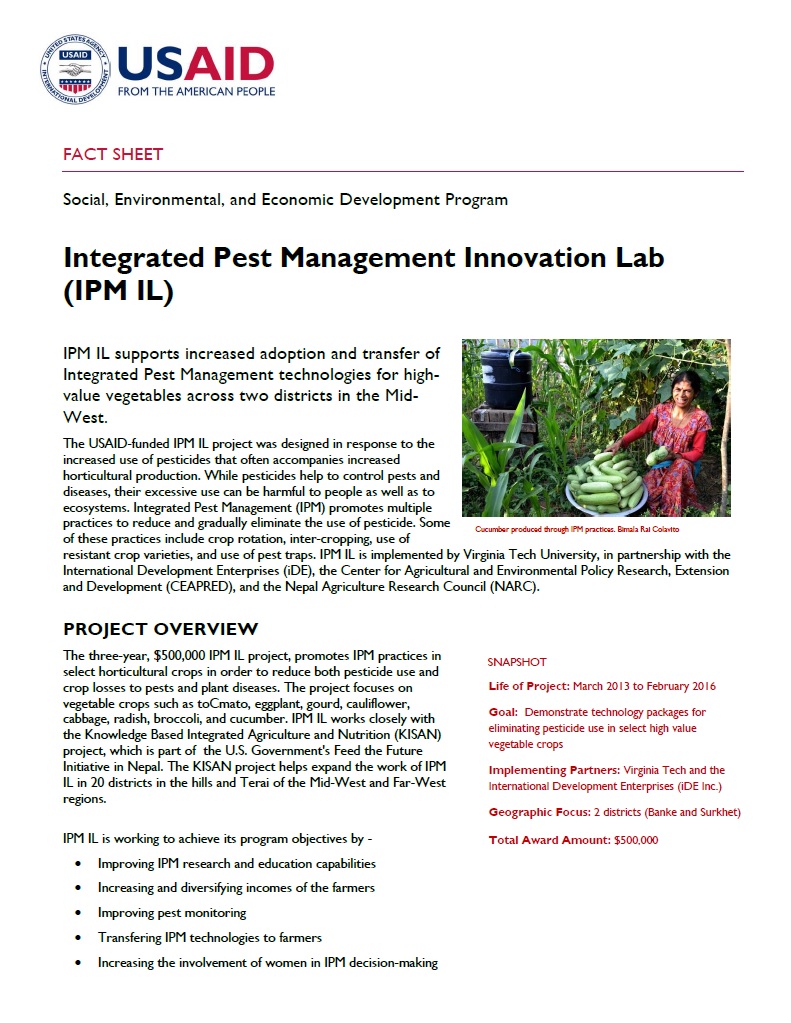IPM IL supports increased adoption and transfer of Integrated Pest Management technologies for high-value vegetables across two districts in the MidWest.
The USAID-funded IPM IL project was designed in response to the increased use of pesticides that often accompanies increased horticultural production. While pesticides help to control pests and diseases, their excessive use can be harmful to people as well as to ecosystems. Integrated Pest Management (IPM) promotes multiple practices to reduce and gradually eliminate the use of pesticide. Some of these practices include crop rotation, inter-cropping, use of resistant crop varieties, and use of pest traps. IPM IL is implemented by Virginia Tech University, in partnership with the International Development Enterprises (iDE), the Center for Agricultural and Environmental Policy Research, Extension and Development (CEAPRED), and the Nepal Agriculture Research Council (NARC).
PROJECT OVERVIEW
The three-year, $500,000 IPM IL project, promotes IPM practices in select horticultural crops in order to reduce both pesticide use and crop losses to pests and plant diseases. The project focuses on vegetable crops such as toCmato, eggplant, gourd, cauliflower, cabbage, radish, broccoli, and cucumber. IPM IL works closely with the Knowledge Based Integrated Agriculture and Nutrition (KISAN) project, which is part of the U.S. Government's Feed the Future Initiative in Nepal. The KISAN project helps expand the work of IPM IL in 20 districts in the hills and Terai of the Mid-West and Far-West regions.
IPM IL is working to achieve its program objectives by -
- Improving IPM research and education capabilities
- Increasing and diversifying incomes of the farmers
- Improving pest monitoring
- Transfering IPM technologies to farmers
- Increasing the involvement of women in IPM decision-making
- Supporting a market for IPM products supplied by commercial agriculture traders
PROJECT ACTIVITIES
Adapting and Implementing IPM Practices for Vegetable Crops:
- Provide improved IPM technologies to vegetable farmers and marketing groups
- Establish agriculture demonstration sites to promote the adoption of IPM practices for tomato, eggplant, and cucumber in Banke and Surkhet districts
- Complete the development of IPM practices for gourds, cabbage, cauliflower, broccoli, and radish
- Train government workers, scientists, farmers, and other stakeholders on the effective use of IPM practices Building Capacity of Nepali Partners:
- Train Nepali scientists in laboratory production of biological controls such as Trichoderma sp., Pseudomonas fluorescens, and Bacillus subtilis, for plant pests and diseases through organized training trips to India and Bangladesh
- Provide on-the-job training on plant pest and disease control by bringing in expert scientists from universities in the U.S.
Supporting Private Sector Involvement in IPM Technologies:
- Identify and support local private sector production and commercialization of bio-inputs such as a beneficial fungus that naturally fight plant diseases, and strengthen the IPM product supply chains
- Assist agro-vets in the procurement and supply of bio-pesticides by linking them to producers
Supporting Gender Equality and Women’s Participation:
- Assess the role of men and women in identifying problems related to pest and diseases
- Identify the impact of implementing various IPM practices on women
- Increase the participation of women in learning and transferring new techonlogy initiatives to farmers
PROJECT RESULTS
- Increased adoption of IPM by farmers
- Improved pest management through IPM practices
- Greater involvement of women farmers in field trials and training
- Increased supply and availability of IPM products and bio-pesticides through private sector channels
- Improved training of agriculture experts and lead farmers on IPM technologies
- Increased number of profitable, environmentally friendly IPM technologies available to farmers
- Scaling up of IPM practices through partnerships with the private sector, KISAN, government agriculture extension services, and agro-vets
- Improved market linkages for farmers through the establishment of collection centers








Comment
Make a general inquiry or suggest an improvement.